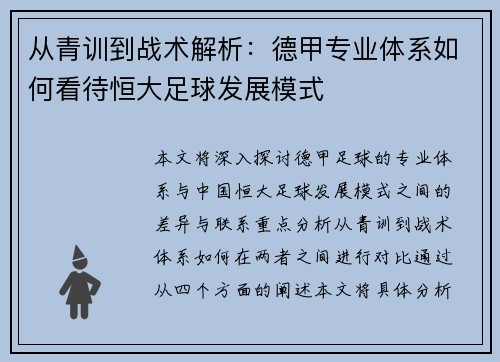德甲降级规则解析每年几支球队会告别顶级联赛及其影响分析
Certainly! Here's the structured article according to your requirements:
**Article Summary:**
欧亿体育官网入口The Bundesliga relegation rules dictate that each year, a handful of teams bid farewell to top-tier football. This article explores the mechanisms behind Bundesliga relegation, its yearly impact on teams, fans, and the league, delving into financial, competitive, and cultural repercussions.
---
**1、Relegation Mechanism and Its Criteria**
The Bundesliga relegation system operates on a promotion-relegation model that impacts several teams annually. The criteria for demotion are multifaceted, involving performance over the season, points accumulated, and head-to-head records. Teams facing relegation experience heightened pressure as they battle to retain their Bundesliga status.

Relegation profoundly affects clubs financially. Loss of television rights revenue and decreased sponsorship opportunities hamper financial stability, often leading to budget cuts in player wages and youth development programs.
Furthermore, relegation impacts club morale and fan engagement. Supporter attendance may dwindle, affecting stadium revenue and team morale, creating a ripple effect in community spirit and local economies.
**2、Financial Implications for Relegated Clubs**
Financial repercussions are severe for relegated Bundesliga clubs. The sudden drop in revenue from broadcast rights and commercial partnerships necessitates immediate financial restructuring. Clubs may face increased debt, player contract terminations, and reduced transfer budgets, affecting their ability to retain key players.
In the long term, relegated clubs often struggle to attract top-tier talent and maintain competitive squads, hindering their efforts to regain Bundesliga promotion. This cycle perpetuates financial instability and affects the club's standing within the footballing community.
Moreover, relegation impacts a club's brand value and marketability. Sponsors and investors may withdraw support, exacerbating financial woes and limiting the club's ability to rebuild effectively.
**3、Sporting and Competitive Repercussions**
Relegation significantly alters a club's competitive landscape. Lower-tier football imposes different challenges and demands on players, coaches, and management. The transition to a more competitive environment requires tactical adjustments and strategic planning to secure promotion in subsequent seasons.
Furthermore, relegated clubs face a competitive disadvantage in player recruitment and retention. Top talents often seek opportunities in higher-profile leagues, leaving relegated clubs with limited resources to attract replacements, thereby impacting team performance and overall competitiveness.
Additionally, relegation disrupts youth development pathways and scouting networks, affecting the club's ability to cultivate future stars and sustain long-term sporting success.
**4、Cultural and Community Impact**
The cultural impact of relegation extends beyond the sporting arena. Bundesliga clubs hold significant cultural and historical importance within their communities, serving as symbols of local identity and pride. Relegation can fracture these bonds, leading to disillusionment among fans and diminishing community engagement.
Local economies reliant on matchday revenues and tourism suffer as relegation reduces visitor numbers and commercial activity around stadiums. This downturn affects businesses, hospitality sectors, and local employment opportunities, amplifying the socio-economic impact of relegation on communities.
Moreover, relegation alters fan dynamics and supporter loyalty. Die-hard fans may drift away during lower-tier campaigns, affecting stadium atmospheres and fan-driven revenue streams essential for club sustainability.
**Conclusion:**
In conclusion, Bundesliga relegation rules govern the fate of several teams annually, impacting them financially, competitively, culturally, and communally. The relegation process is not just a sporting event but a transformative experience that shapes the future trajectory of clubs and communities alike. As clubs navigate the challenges of demotion, they must balance financial stability, competitive resurgence, and community reconnection to reclaim their Bundesliga status and rebuild their footballing legacy.
Ultimately, Bundesliga relegation serves as a stark reminder of football's unpredictable nature and its profound influence on both the game and its stakeholders. It underscores the resilience required for clubs to rise from adversity and thrive in a competitive sporting landscape.

